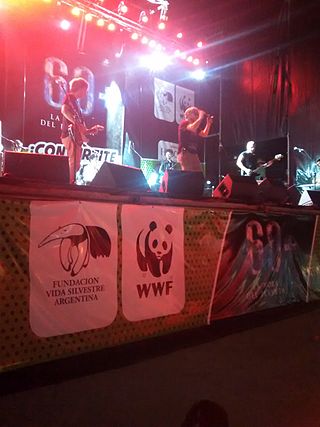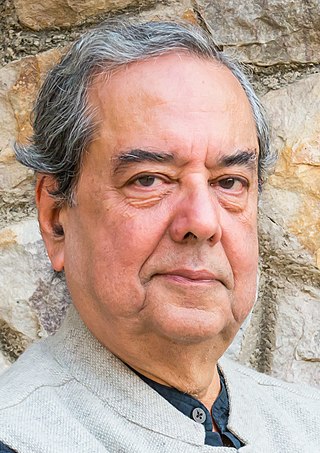Related Research Articles

Natural resources are resources that are drawn from nature and used with few modifications. This includes the sources of valued characteristics such as commercial and industrial use, aesthetic value, scientific interest, and cultural value. On Earth, it includes sunlight, atmosphere, water, land, all minerals along with all vegetation, and wildlife.
The conservation movement, also known as nature conservation, is a political, environmental, and social movement that seeks to manage and protect natural resources, including animal, fungus, and plant species as well as their habitat for the future. Conservationists are concerned with leaving the environment in a better state than the condition they found it in. Evidence-based conservation seeks to use high quality scientific evidence to make conservation efforts more effective.

The International Union for Conservation of Nature (IUCN) is an international organization working in the field of nature conservation and sustainable use of natural resources. Founded in 1948, IUCN has become the global authority on the status of the natural world and the measures needed to safeguard it. It is involved in data gathering and analysis, research, field projects, advocacy, and education. IUCN's mission is to "influence, encourage and assist societies throughout the world to conserve nature and to ensure that any use of natural resources is equitable and ecologically sustainable".

Habitat conservation is a management practice that seeks to conserve, protect and restore habitats and prevent species extinction, fragmentation or reduction in range. It is a priority of many groups that cannot be easily characterized in terms of any one ideology.

The Global Environment Facility (GEF) is a multilateral environmental fund that provides grants and blended finance for projects related to biodiversity, climate change, international waters, land degradation, persistent organic pollutants (POPs), mercury, sustainable forest management, food security, and sustainable cities in developing countries. It is the largest source of multilateral funding for biodiversity globally, and distributes more than $1 billion a year on average to address inter-related environmental challenges.

The National Wildlife Federation (NWF) is the United States' largest private, nonprofit conservation education and advocacy organization, with over six million members and supporters, and 51 state and territorial affiliated organizations (including Puerto Rico and the Virgin Islands).

Environmental education (EE) refers to organized efforts to teach how natural environments function, and particularly, how human beings can manage behavior and ecosystems to live sustainably. It is a multi-disciplinary field integrating disciplines such as biology, chemistry, physics, ecology, earth science, atmospheric science, mathematics, and geography.
The natural environment, commonly referred to simply as the environment, is all living and non-living things that occur naturally on Earth or some part of it. This includes complete ecological units that function as natural systems without massive human intervention, including all vegetation, animals, microorganisms, rocks, atmosphere and natural phenomena that occur within their boundaries. And it includes universal natural resources and physical phenomena that lack clear-cut boundaries, such as air, water, and climate, as well as energy, radiation, electric charge, and magnetism, not originating from human activity.
The Canadian Wildlife Federation (CWF) is a Canadian non-profit organization dedicated to wildlife conservation.
The natural environment, commonly referred to simply as the environment, includes all living and non-living things occurring naturally on Earth.

The World Wide Fund for Nature (WWF) is a Swiss-based international non-governmental organization founded in 1961 that works in the field of wilderness preservation and the reduction of human impact on the environment. It was formerly named the World Wildlife Fund, which remains its official name in Canada and the United States. WWF is the world's largest conservation organization, with over five million supporters worldwide, working in more than 100 countries and supporting around 3,000 conservation and environmental projects. They have invested over $1 billion in more than 12,000 conservation initiatives since 1995. WWF is a foundation with 65% of funding from individuals and bequests, 17% from government sources and 8% from corporations in 2020.

Conservation photography is the active use of the photographic process and its products, within the parameters of photojournalism, to advocate for conservation outcomes.

Ernest Walter Thomas Cooper was the first Wildlife Inspector in Canada. He was formerly the Director for the conservation organization WWF-Canada and the Canadian National Representative of TRAFFIC the global wildlife trade monitoring network. He left WWF and TRAFFIC in 2014, and formed an environmental consulting business, specialising in wildlife trade issues. In 2009, an article in Canadian Geographic referred to Cooper as "Canada’s top wildlife-trafficking investigator."

Fundación Vida Silvestre Argentina is a civil association founded on June 29, 1977, working to address the main environmental issues in Argentina. Its mission is to propose and implement solutions for nature conservation, promote the sustainable use of natural resources, and encourage responsible behavior in the context of climate change. The foundation achieves its goals through various actions, including the protection of natural areas, advocating for environmental legislation, promoting awareness and education, and encouraging responsible consumption and production.

Ashok Khosla is an Indian environmentalist currently based in Delhi. He received his PhD in experimental physics from Harvard University with a doctoral dissertation in the hyperfine structure of hydrogen halide isotopes. He is the co-chair of United Nations Environment Programme’s International Resource Panel (UNEP-IRP) and is internationally known for pioneering and contributing to sustainable development. He is recognized for popularizing the word and concept of "sustainability" in international forums. He was actively involved in various projects that defined the environmental views and activities of institutions such as UNEP, UNESCO, UNU, the U.S. Academy of Sciences, IUCN, and the ICSU/SCOPE. He was also the President of IUCN and Club of Rome. Ashok Khosla is member of the World Future Council.

Blue economy is a term in economics relating to the exploitation, preservation and regeneration of the marine environment. Its scope of interpretation varies among organizations. However, the term is generally used in the scope of international development when describing a sustainable development approach to coastal resources. This can include a wide range of economic sectors, from the more conventional fisheries, aquaculture, maritime transport, coastal, marine and maritime tourism, or other traditional uses, to more emergent activities such as coastal renewable energy, marine ecosystem services, seabed mining, and bioprospecting.
The WWF-Pakistan is a leading environmental conservation organization in Pakistan, established in 1970 as part of the global WWF network. Over the past five decades, WWF-Pakistan has been at the forefront of nature conservation in the country, initiating numerous projects and programs aimed at preserving biodiversity, promoting environmental education, and advocating for sustainable development. The organization has recently celebrated its 50th anniversary, marking a significant milestone in its journey towards creating a future where people live in harmony with nature. Today, WWF-Pakistan continues to expand its efforts, working with various stakeholders to address the pressing environmental challenges facing Pakistan.
References
- ↑ "Former MP Megan Leslie picked as new head of World Wildlife Fund Canada". Global News, October 26, 2017.
- ↑ "Former Toronto Mayor David Miller joins the WWF". canada.com, June 4, 2013.
- ↑ "Climate Change, Sustainable Oceans and Water Conservation | WWF-Canada". www.wwf.ca. Retrieved 2020-05-08.
- ↑ About WWF-Canada